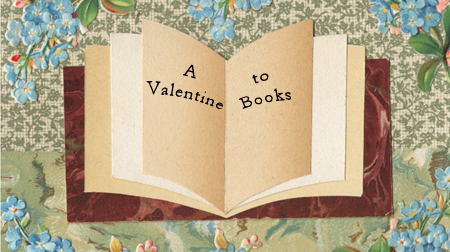A Valentine to Books
For Tina LoTufo, a trip to the bookshelf is a way of rereading her own love story
“When you sell a man a book you don’t sell just twelve ounces of paper and ink and glue—you sell him a whole new life. Love and friendship and humour and ships at sea by night—there’s all heaven and earth in a book, a real book.” Christopher Morley said that, and I couldn’t agree more. God bless the person—probably my father—who first revealed all heaven and earth by handing me a book. It was a successful transaction, accomplished quite early. Several family photos show me firmly ensconced in a lap, engaged in the serious business of being read to, or all on my own with book in hand. In a particularly poignant picture, I have turned my little chair to face the wall, already lost in a good read and evidently unwilling to suffer any distractions from pedestrian reality. Or perhaps I’m just being punished. But what a punishment! If only someone would plunk me down in a chair today and order me to read. I’m sorry, family, coworkers, and friends, but I can’t help you right now; I’m being forced to sit quietly and read until I calm down. This could take a while.
I often use my lunch hour to read, usually while gobbling a sandwich in my car because I know I won’t be bothered there. The other day I pulled into a quiet parking space and tucked into both my lunch and my book. I noticed when another car pulled up beside me a few minutes later, but I was careful not to make eye contact lest my literary reverie be interrupted. It was only when I was ready to leave that I noticed the other driver, napkin on lap and book in hand, obliviously munching away. She was my doppelganger, though a good twenty years older. Once I got over the shock of seeing this Ghost of my Pathetic Future, I felt that some sort of parting salute might be in order, a recognition of kindred spirits, but she wisely avoided making eye contact.
 I’ve been thinking a lot lately about what it means to be a person who needs to read as a fish needs to swim. As a hobby or pastime or mission in life, is reading more or less important than playing a musical instrument, adopting a pet, pursuing an art (or craft), or collecting stamps, or coins? What am I actually accomplishing by this endless quest for the next book? Am I really becoming smarter, more interesting, and better educated? Let’s face it: at the end of this story, there is no music to share, no happier and healthier pet, no work of art (or craft) to display, no collection of . . . hold on. There is a collection, obviously. But what purpose does it serve?
I’ve been thinking a lot lately about what it means to be a person who needs to read as a fish needs to swim. As a hobby or pastime or mission in life, is reading more or less important than playing a musical instrument, adopting a pet, pursuing an art (or craft), or collecting stamps, or coins? What am I actually accomplishing by this endless quest for the next book? Am I really becoming smarter, more interesting, and better educated? Let’s face it: at the end of this story, there is no music to share, no happier and healthier pet, no work of art (or craft) to display, no collection of . . . hold on. There is a collection, obviously. But what purpose does it serve?
“All the books we own, both read and unread, are the fullest expression of self we have at our disposal,” Nick Hornby writes in his book on books and reading, The Polysyllabic Spree. “With each passing year, and with each whimsical purchase, our libraries become more and more able to articulate who we are, whether we read the books or not.” (And God bless him for that last clause.) Is that what it’s all about then? Personal library as means of self-expression? What if I’m expressing, but no one else is listening? I have longed for someone to walk into my house and head straight for the bookshelves: “Let me see what you are reading. Oh, did you like this? I’ve always wanted to read this one!” What a giddy pleasure that would be. But if a book falls in the forest and no one picks it up and says, “Is this any good?” does my life make a sound?
Certainly my personal book collection is of very little interest to my nearest and dearest. I am the lone reader in a house full of philistines. Well, obviously they can all read, but not one of them shares my love of books, my need for books, books, and more books. I know who handed each of my children a book for the first time—it was me. Books in the high chair, books in the car, books in the playpen, books in the diaper bag, books in the bathtub, books in church. They were at home in libraries and bookstores before they could walk. I ordered them books from every crumpled flyer sent home in backpacks, bought them books at every school book fair, diligently listed every summer library book on the book-club form, jammed books into their Christmas stockings and Easter baskets: in short, gave them books for any and all occasions. And they were all readers for years and years and years. And then they stopped. (Mostly. No matter what they say, Manga does not count.) My youngest child will still pick up the occasional book, but at sixteen she has so many other interests that each year reading seems to fall lower down her list of priorities.
Not me. I don’t have a list of priorities. There is only reading. In fact, as I get older reading seems to become more and more vital (though, perversely, more difficult to do at night without falling asleep). And yet, I find myself looking up from my book more frequently, startled by the speed at which the outside world seems to be flying by, and wondering whether I should be doing something else with my time. I’ve begun to approach potential additions to “the stack” based not on the inspiration of the moment or the likelihood that I will actually finish the book, but whether I can justify it as worthy of my (diminishing) time. And when that time is up, what of my books?
Taking a tour of my bookshelves is like reading the story of my own life. Dr. Seuss and Little Golden Books give way to grammar school perennials like Little Women (do you even need to ask which sister?), Doctor Doolittle, The Wind in the Willows, The Secret Garden, Little House on the Prairie, and the Narnia books. Those were heady days. Then, sometime during my junior-high years, books inexplicably took an ominous turn: I could no longer count on the happy ending. Protagonists who had previously survived great adventures, thriving on the important lessons they learned, were suddenly dropping like (Lord of the) flies. I began to lose interest. That’s when a beloved high-school teacher saved the day with the beautiful rhythms of Shakespeare and the King James Bible. (Thank you, Dr. Cook.) And raiding my older brother’s bookshelves, I found the brave new worlds of Ray Bradbury, Robert Heinlein, Isaac Asimov, and Michael Moorcock.
Later, I stumbled upon Cold Comfort Farm, Kristin Lavransdatter, A Confederacy of Dunces, To Kill a Mockingbird, I Capture the Castle, Pilgrim at Tinker Creek, The Hitchhiker’s Guide to the Galaxy. They are all still there on my shelves, along with the numerous crazy, twisty rabbit trails I created for myself as one author or topic of interest led to another. Classic plays by Kaufman and Hart, the spirituality of Brother Lawrence and the Russian Pilgrim, the hilarious anti-domesticity of Peg Bracken and Shirley Jackson, the lyrical world of faith described by Frederick Buechner, the sweet whimsy of Peter Beagle, time travel with Jack Finney, Margaret Drabble’s novels of modern England. Happy Christmas vacations stretched out on the sofa reading Tove Jansson, Jasper Fforde, and Harry Potter. Summers spent devouring the complete works of Jane Austen and Flannery O’Connor. (It is a truth universally acknowledged that a good man is hard to find.) One voice melds into another and somehow moves me on to the next.
For anyone who has ever wondered whether others might find it strange that many of your most satisfying relationships are with people who have been dead for at least fifty years, I offer the following lovely quotation from Through the Magic Door, in which Sir Arthur Conan Doyle serves as tour guide to his own library (circa 1907): “I care not how humble your bookshelf may be, nor how lowly the room which it adorns. Close the door of that room behind you, shut off with it all the cares of the outer world, plunge back into the soothing company of the great dead, and then you are through the magic portal into that fair land whither worry and vexation can follow you no more. You have left all that is vulgar and all that is sordid behind you. There stand your noble, silent comrades, waiting in their ranks. Pass your eye down their files. Choose your man. And then you have but to hold up your hand to him and away you go together into dreamland.” There’s only one caveat: “The dead are such good company that one may come to think too little of the living.”
You are preaching to the choir, Sir Arthur. In fact, come to think of it, I do not regret the time I have spent with any of the fascinating individuals, whether living or dead, represented by my idiosyncratic library. The stories they tell have provided some of the greatest joys of my life, and I like to think they would appreciate that I have been listening. Most of my books will outlive me, just as Conan Doyle’s library outlived him. But with a little luck, many of them will find their way to other open hearts, likely completely unknown to me, fellow lovers of those “noble, silent comrades.” So here’s to you, much older lady in the car next to mine at Captain D’s, and long may we read.
Tina LoTufo, a Chapter 16 contributing writer, lives in Chattanooga.


